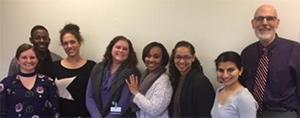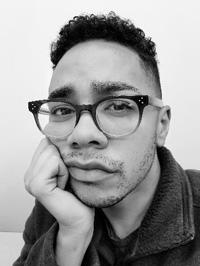
Sharon Casapulla, Ed.D., M.P.H., Director of Education and Research, Office of Rural and Underserved Programs

I was so moved by the narrative medicine training I attended in 2016 with Rita Charon, M.D., Ph.D. , at Columbia University that I came back and asked our college administration to support a team of faculty to attend and train together at Columbia the following spring. This group committed to develop a pilot narrative medicine program at the Heritage College. I am deeply proud of all that our small team of facilitators have accomplished with our Open Book Project in the years since.
Since 2017, a team of 14 dedicated faculty and staff from across Heritage College departments and the Scripps College of Communication have worked diligently to develop a unique program grounded in the practices of narrative medicine. Part of a larger movement to embrace diversity, cultivate inclusion and promote affiliation for all Heritage College students, faculty and staff, the OBP is now in its third cohort and has initial approval to move forward as an elective.
The Open Book Project is a yearlong course dedicated to improving participants’ narrative medicine skills while exploring issues of social justice and inclusion. Narrative medicine includes techniques and strategies to harness the power of stories in clinical encounters. It is important for medical students to develop humanistic skills, such as empathy and perspective taking. Through the process of close reading, radical listening and expressing our own stories, narrative medicine facilitates relationship building and a deeper understanding of physicians and patients alike.
Students who choose to participate in the Open Book Project join a small group of fellow students and two facilitators twice a month to examine a piece of narrative work (paintings, poems, short stories, etc.) and engage in the practices of narrative medicine including close reading, radical listening and reflective writing. The sessions run 90 minutes over the lunch hour and require little preparation. We ask that students come ready to be an active participant and “respectful and humble witness.”
Below are some reflections about the Open Book Project from one of our facilitators and two students:
Robin Newburn, D.O. (’93), Assistant Clinical Professor of Primary Care Medicine

Some of us exist in a state of being in which we daydream, imagine and think creatively about everything … all of the time. I have known since at least first grade that I am one of these people.
I gaze out of a window and become lost in the colorful details of the feathers of a bird’s wings, searching for clues that may reveal materials used for nest construction. The shapes of clouds floating by hint at the images they’ve been morphing into and out of before finally vanishing into the sacred stillness of the atmosphere. And watching a person briskly walking down the street, I wonder if the story of their life is anywhere close to the one I have imagined. I enjoy the freedom I feel when my mind expresses itself in this way as it creates stories from the experiences of my senses.
A lifelong passion for reading and writing led me to the Open Book Project, a narrative medicine group now in its third year at the Heritage College. As a family physician, I recognize and appreciate the fact that everyone has a story … our patients have stories. Learning to listen and respect their stories helps foster a physician-patient relationship built on trust and communication.
Using literature, poetry and visual art to write to a prompt and participate in enriching discussions centered on the theme of social justice in a safe, intimate small group setting has been evolutionary for me. Not only is it an outlet for some of my creativity, but it helps me stay energized and passionate about patient care by connecting to patients in a different way – by focusing on the person, the story, the life and not just the disease.
Kayla Marrero, OMS-I, Rural and Urban Scholars Pathways Program
I graduated from a Quaker college before starting medical school; the college’s mission and the foundation of my education were deeply rooted in the Quaker core values of peace, social justice, community and equality. Throughout my time there, these values became mine also, and it shaped the way in which I view the world around me, my responsibilities within it and the experiences of others.
Starting medical school, I was nervous I wouldn’t have an opportunity to engage in conversations that would nurture that more emotional side of me, that medical school and the humanities couldn’t cohabitate. When I first heard about Open Book Project, I knew it could be that outlet for my humanistic interests. It challenges participants to look deep within themselves to question their implicit biases and beliefs around issues of social justice and allows space for unedited, open-hearted reflection. I was drawn to its call for vulnerability, its power to facilitate difficult yet necessary conversations and its ability to foster meaningful, genuine connections through storytelling.
In many ways, being a part of Open Book Project has helped me maintain my dimensionality, my authenticity, during my first semester of medical school; it has allowed me to connect with faculty and fellow students outside the context of ‘medical student.’ Joining Open Book Project has given me that space of emotional expression and introspective thought that I feared I would lose while immersed in a medical education. It has been a breath of fresh air in a process that can at times feel stagnant and unidimensional, serving as a reminder of why I chose medicine in the first place: to help, to advocate, to connect.
Michael Arnold, OMS-II, Transformative Care Continuum

Anxiety is contagious. It’s the emotional manifestation of a yawn, whose virality is on the same level as the cutest kitten videos across the galaxy of the internet. Medical school has taught me that anxiety is more easily spreadable than most of the communicable diseases we are trying so hard to memorize and learn. The biochemical structure of the anxiety virus has perfectly adapted to survive in high-stress environments like medical school. The virulence factors embedded in the genome of the anxiety virus leaves many emotional immune systems helpless to its invasion and replication.
Learning how to navigate this minefield of anxiety is paramount if you want to achieve a modicum of success absorbing the important information out of the overwritten chapters assigned to us from prep guides longer than CVS receipts. That is why programs like Open Book are so important. Open Book is more than an emotional outlet; it is more than self-care; it is more than a study break. It helps students process past, current and future emotions. It is an emotional prophylactic, like a vaccine against anxiety.
Each of us are living and breathing collections of stories. Open Book has taught me about how stories can heal us and our patients. Stories can create relationships; it can strengthen them and even mend broken ones. Active listening is not a skill that you learn in medical school, and I firmly believe that is a disservice to us and our future patients. Television shows have distorted the reality that a comprehensive patient history is one of the most effective diagnostic tools that doctors have.
Open Book is a perfect name for the program. It teaches us how to reach deep down and conjure our stories. It teaches us to be fully present and to share those presents with others. It teaches us how to practice radical vulnerability in a world that often shuns vulnerability as weakness. In a sense, we learn how to heal and grow because the program teaches us how to transform ourselves into open books.
To learn more about the Open Book Project, check out these two articles authored by our facilitators:
- Kerr, A., Shaub, T., Casapulla, S. Manzi, J., & Smith, C.(2019). Addressing social justice and inclusion in the classroom: Using the principles of narrative medicine to discuss identity negotiation and passing. Communication Teacher. https://doi.org/10.1080/17404622.2019.1625939
- Casapulla, S., Bianco, J., Harter, L., Kropf, K., Shaub,T., Kerr, A., Blais, F., Newburn, R., Nandyal, S., Ofei-Tenkorang, N., Biechler, M., & Baker, B. (2018). Moving toward narrative competence and inclusive health care through the Open Book Project. Health Communication . https://doi.org/10.1080/10410236.2018.1551302
